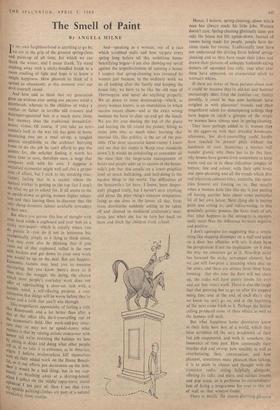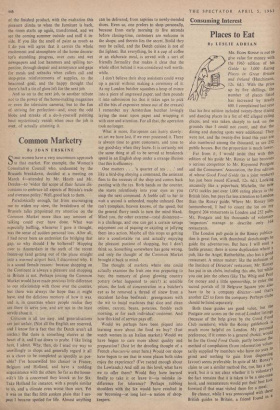The Smell of Paint
By ANGELA MILNE I F my own "neighbourhood is anything to go by, we are in the grip of the greatest spring-clean and paint-up of all time; for which we can thank the winter, and I mean thank. To stand daubing away with a sticky-handled brush in a room smelling of light and hope is to know a simple happiness. How pleasant to think of it Spread so abundantly at this moment over our do-it-yourself island.
And' how odd to think that my generation grew up without ever seeing our parents wield a paintbrush, whereas to the children of today a mother or father in terrible old trousers and distemper-spattered hair is a much more likely first memory than the traditional dressed-for- dinner vision. Of course, if you take an eco-Ns nomist's look at the way life has gone in home decorating you see a mad set-up, a tangled Pattern simplifiable to the architect hurrying home to do the job he can't afforcl to pay the painter for, the solicitor finding it worth his spare time to save, therefore earn, a wage that Compares well with his own. I suppose a socialised economist might well call this a proper state of affairs, but I stick to my sneaking reac- tionary feeling that in a society where the manual worker is getting to the top fast I don't see what we go to school for. It all seems to me as upside-down as giving women higher educa- tion and then leaving them to discover that the only Lcheap domestic labour available nowadays is their own.
But when you pursue this line of thought with Your head inside a cupboard and your feet on a sticky newspaper - which is usually where you do pursue it—You do it not in bitterness but academically, simply as a thing to think about, may even also be thinking that if you -came out of that cupboard, called in the men with buckets and got down to your own work You would be up. on the deal. But not happier. .corlomie factors may lead you to amateur decorating, but you know there's more to it than that; the struggle, the doing, the chance Which most people's everyday work does not °. ffer. of approaching a clear-cut task with a bumble mind, a self-effacing purpose. a con- sciousness. that things will be worse before they're better and a faith that you'll win through. This magnificent opportunity of feeling a little 'Ike Rembrandt and a lot better than after a the at the office lifts do-it-yourselfing out of h e econornist's field. Our work-and-pay stale- % ture — may or may not be upside-down; what honest is that by mixing artistic endeavour with toil we're restoring the balance we lose bo'nest y sitting at desks and doing what other people tv"1- us. If we take it to extremes, as in America, ,,,!1re I .believe bra inworkers kill themselves all their added work on the Home Beauti- !-.U1) or if our efforts put decorators on the dole, 1313:11 it would be a bad thing; but in my cup- rd, or -brushing away at a skirting-board, r.,cn I reflect 'on the mildly topsy-turvy social 44eaval. I am part of, then I. sec that even terrible painting-clothes are part of a natural lartakaWa from routine. And—speaking as a woman, one of a race which scrubbed walls and beat carpets every spring long before all this ambitious home- beautifying began—I am also showing my revolt against the unperfectionism of running a house. I suspect that spring-cleaning was invented by women just because, in the ordinary work we do of looking after the family and keeping the house tidy, we have to be like the old man of Thermopylte and never do anything properly. We sit down to some dressmaking—which, as every woman knows, is an immolation in which success means chaos—and at the exact wrong moment we have to clear up and get the lunch. We are for ever dusting the top of the piano and leaving the bit round the pedals; tilting so many jobs into so much time; learning that married life, like politics, is the art of the pos- sible. (The most successful home-runner I know told me that her motto is 'Keep your standards down.) It would be comforting to remember all the time that the large-scale management of hours and people adds up to success in the house- wife's job;- but this entails on a lower practical level so much half-doing, and half-doing is the hardest thing in the world. The difficulties of the housewife's lot have, I know, 'been desper- ately plugged lately; but I haven't seen anything said about the poor thing's constant temptation, living as she does in the house all day, from brass doorknobs suddenly asking to •be taken off and cleaned to medit.cval craftsman's stan- dards just when she has to turn her back on them and fetch the children from school. Hence, I believe, spring-cleaning, about which man has always made his little joke. Woman doesn't care. Spring-cleaning gloriously turns not only the house but life Upside-down. Instead of rooms being made for people, people have be- come made for rooms'. Traditionally Med have not understood the driving force behind spring- cleaning and so they have made their jokes and drawn their pictures of unhappy husbands eating dinners off up-ended lino rolls; year after year these have appeared, an exasperated salute to woman's whims.
If there are fewer of these pictures about now it could be because they're old-hat and humour increasingly shies. from the familiar—or, faintly. possibly, it could be that now husbands have weighed in with plasterers' trowels and their magnificent talent for distempering ceilings they have begun to catch a glimpse of the magic we women have always seen in spring-cleaning.
They have perhaps added to it; women may be the eggers-on with their dreadful home-con- sciousness, but do-it-yourselfing - could hardly have reached its present pitch without the handiness of men. Sometimes a woman will wonder glumly why there has to be this fuss, why houses have grown from somewhere to 'keep warm and eat in to these ridiculous temples of texture, line and colour, with their split levels and open planning and all the trends which film and television cameras (they, naturally, like open- plan houses) are foisting on us. But usually when a woman .feels like this she is just putting off having another hate about some particular bit of her, own house. Next thing she is buying paint and setting to; and rediscovering, in this genuinely artistic process, the basic truth of art, that what happens in the setting-to is mysteri- ously more than the difference between negative and positive. I don't apologise for suggesting that a simple thing like slapping distemper on a wall and paint on a door has affinities with art; it does have the perspiration if not the inspiration—or it does the way we amateurs go at it. Non-drip paint has lessened the sticky newspaper element, but we can still .footprint a lessening white disc up the stairs, and there are always those three fears looming: that this time the floor will not clean up, the radio. will have painty knobs for ever and our hair won't wash. There is also the tough fact that painting has to go on after it's stopped being fun; and at the end of each day's slog we know we can't go on, and at the beginning of the next come fresh to it. Perhaps the Sistine ceiling produced some of these effects as well as the famous stiff neck.
But wliat..happiness home decorators know in their little bare box of a world, which they have scrubbed till the very brushwork of their last job reappeared, and with it, somehow, the innocence of time past. How contentedly their brushes dab and swoop, how sensible, as well as reverberating, their conversation; and how pleasant, sometimes More pleasant than talking, it is to paint in silence and thought with the transistor radio,' sitting helpfully alongside, offering its talks and plays and. science lessons and pop music as it performs its extraordinary feat of fixing a' programme for ever to this bit of wall or that •window-frame.
There is. finally the' almost alarmine ,ple,t,sure of the finished product, with the exaltation this pleasure climbs to when the furniture is back, the room starts up again, transformed, and we see the coming summer outside and sniff it in- side. If you like the smell of paint as much as I do you will agree that it carries the whole excitement and atmosphere of the home decora- tor's stumbling progress, over cans and wet newspapers and lost hammers and spilling tur- pentine, through despair and annoyance and gaps for meals and setbacks when callers call and stop-press reinforcements of supplies, to the beaconed goal; and the happy thought that there's half a tin of gloss left for the next job.
And so on to the next job, to another tribute not to the power of the home-making magazines or even the television cameras, but to the fun of striving for perfection—and, since the odd blobs and streaks of a do-it-yourself painting bout mysteriously vanish when once the job is over, of actually attaining it.



































 Previous page
Previous page